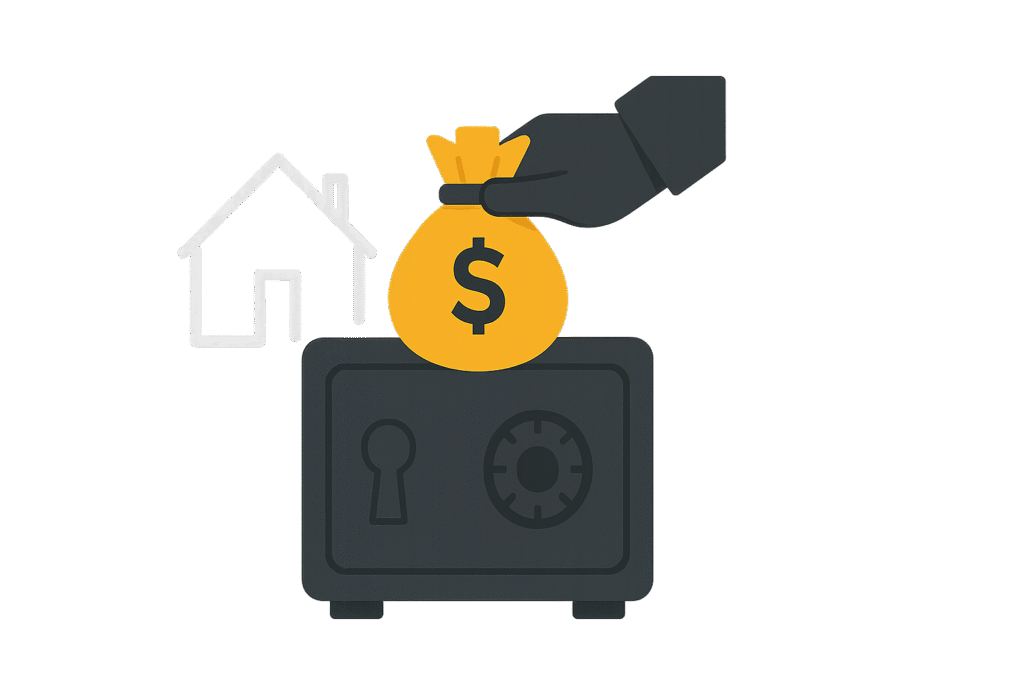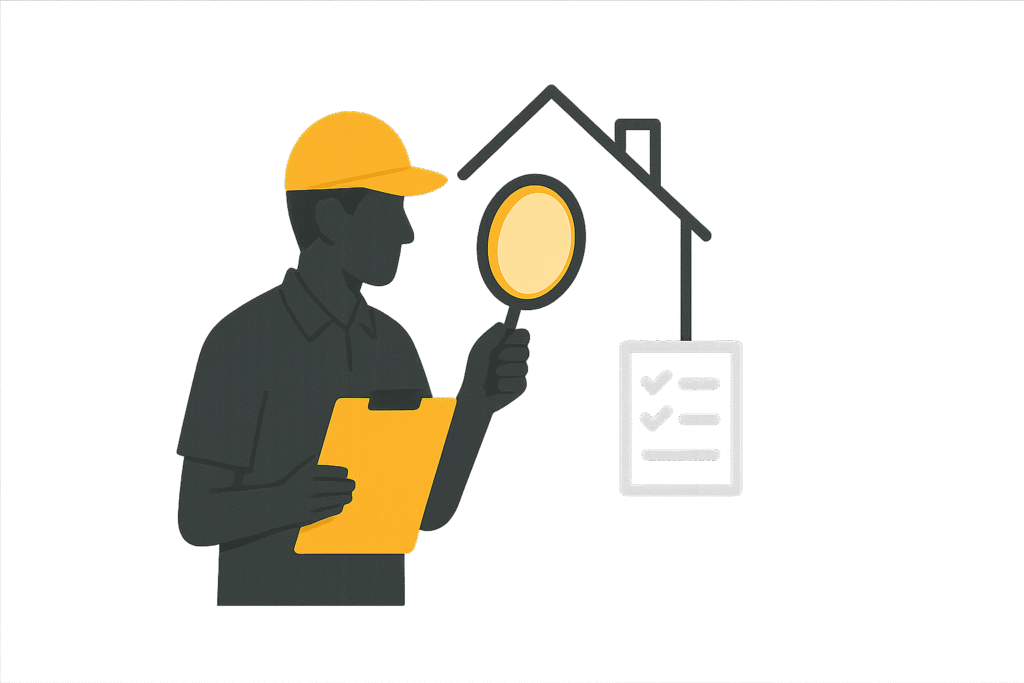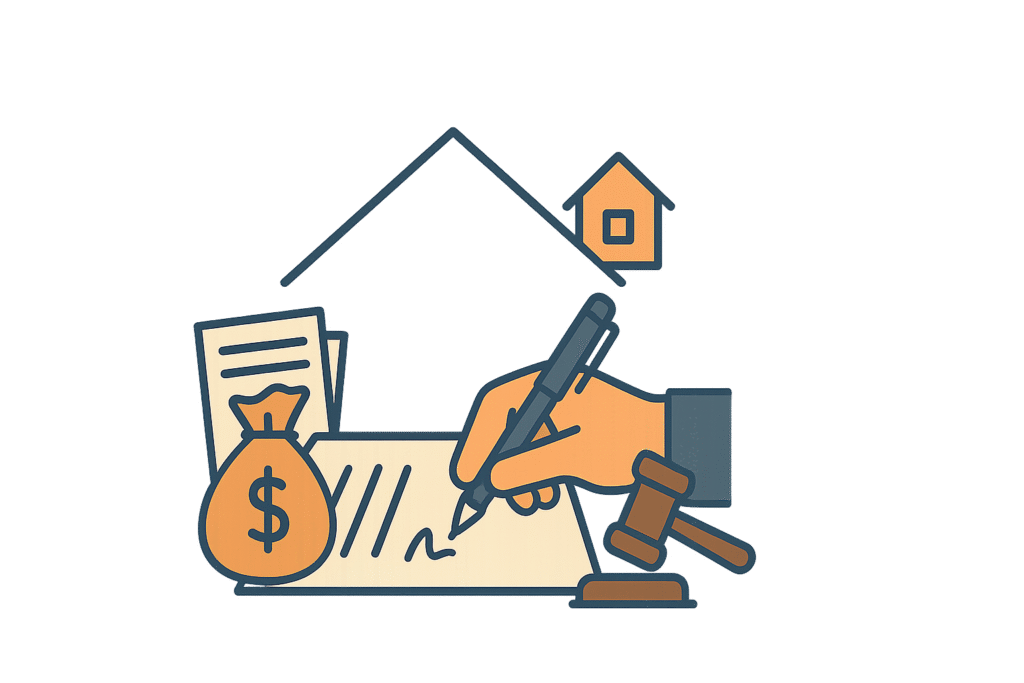The Georgia Closing Day Process: Your 8 Essential Steps for Home Buyers
Buying a home in Georgia can feel like a complicated journey, especially when you reach the closing phase. As a Georgia closing attorney with two…

Buying a home in Georgia can feel like a complicated journey, especially when you reach the closing phase. As a Georgia closing attorney with two decades of experience, I’ve guided countless families through this process. Understanding the eight key steps can turn what seems like a complex maze into a clear path to homeownership.
Georgia’s closing process is unique because state law requires a licensed closing attorney to handle every real estate transaction. This legal requirement adds a strong layer of protection. Knowing what to expect during each step will help ensure a smooth closing and a successful home-buying journey.
1. The Foundation: Steps Leading Up to the Closing Date
The Georgia closing day process begins weeks before you sit down at the closing table. These initial steps build the foundation for everything that follows. Missing a detail now could delay your closing date or create complications later.
1.1. Finalizing the Initial Agreement and Earnest Money
Your purchase agreement (sales contract) is the roadmap for your entire real estate transaction. This legally binding document outlines the sales price, the closing date, and all the conditions that must be met before ownership transfers. Successful closings always start with clear, well-defined terms.
The contract must clearly state who pays for what during the closing process. This includes attorney fees, costs for the title insurance policy, and transfer taxes. In Georgia, buyers commonly pay for the title search and their lender’s title insurance policy, while sellers typically cover the owner’s title insurance policy. Your real estate agent will negotiate these terms. Understanding your financial obligations early prevents surprises later.
1.2. Depositing the Earnest Money Deposit

The earnest money deposit shows your serious intent to buy the property. This money goes into an escrow account managed by either the closing attorney or a licensed real estate brokerage.
- Typical Range: Earnest money usually ranges from 1% to 3% of the home’s purchase price, but this can vary based on local market conditions.
- Purpose: The money is protected until closing day. If the sale proceeds, it’s credited toward your down payment and closing costs.
- Contingencies: If the deal falls through because a contingency isn’t met, the earnest money returns to you based on the terms in your purchase agreement.
⚠️ Wire Fraud Warning: Never wire earnest money without verifying the recipient’s information directly with your real estate agent or closing attorney. A quick phone call is crucial to avoid wire fraud schemes that often target these early transactions.
2. Navigating the Due Diligence and Contingency Period
The period after signing the contract is reserved for due diligence. This is your chance to make sure the property is what you expect and that you can secure financing.
2.1. Completing the Home Inspection and Home Inspection Reports

The home inspection is your opportunity to uncover any hidden problems with the property. Professional inspectors examine everything from the foundation to the roof. Their detailed home inspection reports highlight both minor issues and major concerns.
- Smart Action: Attend your home inspection whenever possible. Seeing the property with the inspector gives you firsthand knowledge of its condition.
- Negotiation: The inspection contingency typically allows 7-10 business days to complete this process and negotiate any necessary repairs.
- Prioritize: Focus on safety issues, major structural problems, or expensive system failures. Cosmetic concerns should be noted for the future.
2.2. Addressing the Appraisal Contingency
Your lender requires an independent appraisal to confirm the home’s value matches the loan amount you’re requesting. This protects everyone from overpaying for the property. The appraisal contingency provides an exit strategy if the appraised value comes in too low.
- Cost: Appraisal fees typically range from $400 to $600 in Georgia, paid upfront by the buyer.
- Value Factors: The appraiser compares the property to similar recent sales, considering market conditions, property condition, and location.
- Low Appraisal Options: If the appraisal is low, you can negotiate with the seller to lower the sales price, bring extra cash to closing, or use the contingency to cancel the contract.
2.3. The Real Estate Agent’s Role in Negotiations
Your real estate agent is your advocate during this crucial negotiation period. They communicate with the seller’s agent regarding inspection requests, appraisal issues, and any other concerns.
- Coordination: Experienced agents coordinate with all parties, including your lender and the closing attorney.
- Payment: The agent’s commission is paid at closing from the sale proceeds. Their expertise is vital for reaching the finish line successfully.
3. Securing Final Loan Approval from the Buyer’s Lender
The mortgage process takes up much of the time leading up to the Georgia closing day process. Securing your final loan approval is a major step.
3.1. Underwriting and Clearing Conditions
The underwriting process involves a thorough review of your finances to ensure you qualify for the loan amount at the agreed-upon interest rate and loan terms. The underwriter examines your income, assets, debts, and credit history.
- Documentation: Be ready for requests for additional documentation, such as recent pay stubs or bank statements.
- Speed: Responding quickly to these requests keeps your loan on track and prevents delays.
- Milestone: Receiving final loan approval means all conditions are cleared.
3.2. Why Financial Consistency is Required
Maintaining financial stability is critical for a successful closing. Your lender checks your credit and accounts right up until closing day.
- Avoid: Do not make large purchases, open new credit accounts, or change jobs during this period.
- Risk: Even financing new furniture can disrupt your debt-to-income ratio and put your loan approval at risk.
- Consult: If you must make any financial changes, discuss them with your lender first.
4. The Title and Disclosure Review Period
The legal aspects of your transaction are a major part of the Georgia closing day process. The state’s attorney requirement ensures these complex issues receive proper professional oversight.
4.1. The Title Search and Title Insurance Policy
Georgia law requires a licensed closing attorney to conduct every real estate transaction. The title search is one of the attorney’s most important duties.
- Purpose of Title Search: The attorney examines public records to trace the property’s ownership history. They look for potential issues that could affect your ability to get clear ownership.
- Common Issues: Title searches can uncover unpaid contractor liens, boundary disputes, or tax issues.
- Clearing the Title: A clear title means you take ownership without any legal disputes. The closing attorney works to resolve any liens, public records discrepancies, or ownership issues before the closing date.
4.2. Understanding the Protection of a Title Insurance Policy
Title insurance protects you from financial loss if title problems arise after closing. Unlike other insurance, it covers issues that existed before you bought the property but weren’t discovered during the title search.
- Lender’s Policy: Your lender requires a lender’s title insurance policy to protect their financial interest.
- Owner’s Policy: You can purchase an owner’s title insurance policy to protect your ownership rights. This one-time cost protects you for as long as you own the property.
- Security: Title insurance is a safeguard against forged documents, undisclosed heirs, and recording errors.
4.3. Reviewing the Closing Disclosure (CD)
Federal law requires your lender to provide the Closing Disclosure (CD) at least three business days before your scheduled closing date. This document contains all final loan terms, monthly payments, and closing costs.
Comparing the CD to the Loan Estimate
The CD must be compared to your original Loan Estimate (provided shortly after application).
- Key Items: Compare your loan amount, interest rate, monthly payment, and total closing costs.
- Discrepancies: While small variations in third-party fees are normal, large changes in lender fees or unexpected new charges need immediate attention from your loan officer.
Closing Costs Breakdown for Georgia Home Closing
| Category | Description | Typical Cost (Georgia) |
|---|---|---|
| Lender Fees | Includes loan origination, underwriting, and processing charges. | Varies (1–2% of loan) |
| Third-Party Fees | Covers appraisal ($400–$600), inspection, and attorney fees ($400–$800). | $800–$1,400 total |
| Government Fees | State and county fees for recording the deed and transferring ownership. | $50–$200 |
Note: Costs are estimates and may vary based on loan amount, property, and local regulations. Always review your Closing Disclosure for exact figures.
Breakdown of Lender Fees and Attorney Fees
The CD separates costs into different categories:
- Lender Fees: These include loan origination fees, underwriting, and processing charges.
- Third-Party Fees: These cover services like appraisal fees, inspection costs, and attorney fees. In Georgia, attorney fees for closing services typically range from $400 to $800.
- Government Fees: Costs imposed by the state and county for recording your deed and transferring ownership.
5. The Final Countdown: Preparing for Closing Day
The final week before closing requires sharp attention to detail. Active preparation now prevents last-minute problems.
5.1. The Final Walkthrough
The final walkthrough typically happens 24-48 hours before closing. This is your last chance to inspect the property before taking ownership.
- What to Check: Focus on confirming any negotiated repairs were completed satisfactorily. Also, ensure the property remains in the same condition as when you agreed to purchase it.
- Confirmations: Test key systems like heating and plumbing. Confirm the seller has moved out and left the property in the agreed-upon condition.
What to do if you find Last-Minute Surprises
Discovering issues now is stressful, but most can be resolved.
- Communication: Immediately contact your real estate agent and closing attorney.
- Solutions: Minor issues like incomplete cleaning might be fixed by holding money in escrow. Major issues may require delaying the closing until a repair is complete.
- Documentation: Document any problems with photos and notes.
5.2. Arranging the Final Funds Transfer
Your closing attorney will provide a settlement statement with the exact amount due. This figure includes your down payment (minus your earnest money deposit) plus all remaining closing costs.
- Timetable: Plan to have your funds ready one or two days before closing to allow time for processing.
- Calculation: The total accounts for prorated property taxes, homeowner association fees, and other adjustments.
Warning Against Wire Fraud
Wire transfers are the most secure way to transfer large amounts, but they are a target for criminals.
- Verify Instructions: Always verify wiring instructions by calling the closing attorney’s office directly using a phone number you obtained independently.
- Protect Yourself: Never rely solely on emailed wiring instructions. A quick phone call can save you from losing your entire down payment to fraud.
6. Closing Day: The Final Step in the Real Estate Transactions Process
The day you’ve worked toward is here. Understanding what happens at the closing table helps you participate confidently.
6.1. The Real Estate Closing at the Law Firm
The meeting usually takes place at the closing attorney’s office.
- Required Documents: Bring a current, government-issued ID (driver’s license or passport). Also, bring confirmation of your wire transfer or your cashier’s check made payable as instructed.
- Attendees: The licensed closing attorney facilitates the meeting. Your real estate agent attends for support. The seller and their agent may also be present.
6.2. The Signing of the Critical Legal Documents

You will sign numerous documents. The attorney will explain each one, but these are the most important:
- Promissory Note: Your promise to repay the loan. It specifies your loan terms and monthly payments.
- Security/Deed of Trust: This document pledges the property as collateral for the loan. It gives the lender the right to foreclose if you fail to repay.
- Warranty Deed: This is the document that officially transfers ownership of the property from the seller to you. It includes the legal description and is recorded publicly.
7. The Final Settlement and Prorations
Understanding the flow of money is essential for the Georgia closing day process.
7.1. Final Settlement Statement (ALTA)
The settlement statement provides a detailed accounting of all money changing hands during your closing.
- Distribution: It shows exactly how your loan proceeds, down payment, and other funds are distributed to pay off the seller’s mortgage, commissions, and all fees.
- Record: This accounting creates a clear record of the financial aspects of your transaction for both parties.
7.2. Prorations of Property Taxes and other Additional Fees
Property taxes and other expenses are typically prorated between the buyer and seller based on the closing date.
- Fair Payment: These calculations ensure each party pays only for the time they actually own the property.
- Other Items: Other prorated items might include homeowner association fees or utility deposits.
8. Post-Closing Checklist for the New Homeowner
Your home purchase doesn’t end when the papers are signed. A few final steps complete the legal transfer and set you up for homeownership.
8.1. The Attorney’s Responsibility: Recording and Disbursement
The closing attorney is responsible for these final legal and financial steps:
- Recording the Deed: The attorney records your warranty deed with the county clerk’s office, typically within 24–48 hours. This establishes your legal claim to the property.
- Disbursement of Funds: They disburse all funds, paying off the seller’s mortgage, distributing commissions, and paying service providers.
8.2. Setting Up Utilities and Receiving Final Documents
There are a few important details to take care of right away:
- Utilities: Contact utility companies immediately to establish service in your name. This includes electricity, gas, water, and internet services.
- Original Documents: You will receive original or certified copies of your recorded warranty deed and your title insurance policy by mail within a few weeks. Store these documents safely.
Navigating Georgia’s Unique Closing Process: Special Considerations
Georgia’s unique closing laws are designed to protect the consumer.
The Attorney-State Requirement
Georgia law requires a licensed attorney to conduct all real estate closings. This is because real estate transactions involve complex legal issues that require professional legal oversight. This system provides legal expertise and consumer protection.
Utilizing a Remote Closing or a Power of Attorney (POA)
Alternatives are available if you cannot attend closing in person.
- Remote Closing: Video conferencing technology has made remote and hybrid closings more practical and secure.
- Power of Attorney: A POA allows you to designate someone to sign closing documents on your behalf. Specific Georgia Law requirements for POAs must be met, and the document must be reviewed by your lender and attorney in advance.
Common Misconceptions for First-Time Homebuyers
| Myth | Reality |
| Closing Dates are set in stone. | Closing dates are often fluid. Factors like loan delays, title issues, or appraisals can cause shifts. Build flexibility into your planning. |
| Closing Costs are just a few hundred dollars. | Closing costs typically range from 2% to 5% of the home’s purchase price. This includes lender fees, government fees, and escrow account funding (money held for future taxes and insurance). |
Final Word: Ensuring a Smooth Home-Buying Journey
The key to a smooth closing is preparation, communication, and realistic expectations. Respond promptly to requests from your lender and attorney, and ask questions whenever you don’t understand something.
Focus on the big picture: you are making a significant investment in your future. Trust the expertise of your real estate agent, lender, and closing attorney. With professional guidance, your Georgia closing day process will mark the beginning of an exciting new chapter in your life.





